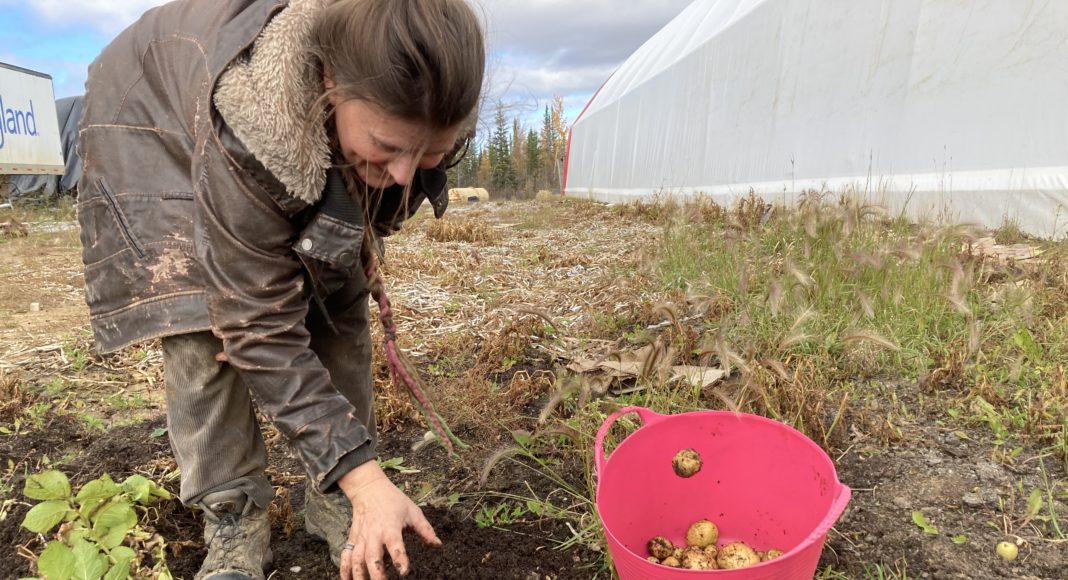Producers and consumers in the Canadian North have unique problems when growing potatoes, showing there is no one-size-fits-all solution.
The Canadian North is a vast, rocky area with a short growing season. But with almost 24-hour summer sunshine and technological advancements, it’s showing promise when it comes to producing more locally grown food.
Communities and governments across the north are pushing for better access to fresh food and, in some cases, self-sustainability. Some northern areas can support commercial food production while others don’t have the large swatches of land available, making backyard gardening a better fit. When it comes to growing food in the north though, there isn’t a one size fits all solution.
“People have been solving problems up there in terms of their food systems and having a healthy diet. It’s a complicated system that people have been working on for years, and the reliance on fresh food being transported in from southern Canada and from the United States,” Julia Wheeler with Agriculture and Agri-Food Canada (AAFC), explains.
Wheeler is a cold-climate plant eco-physiologist who is in the midst of a four-year study on using season extension technologies in the North. But she isn’t the only AAFC research scientist working on northern food production.
AAFC Research Scientist Helen Tai has partnered with the Northern Farm Training Institute (NFTI) in Hay River, N.W.T. to test true potato seed. There’s also groups such as the Yukon Grain Farm who have been working for years to provide food for their communities.
Each of these producers and researchers make for a mix of food production in the North.
Food Insecurity in Canada’s North
With short growing seasons and remote communities, food insecurity is disproportionately worse across the northern areas of Canada.
The rates of household food insecurity are 16.9 per cent in the Yukon, 21.6 per cent in the Northwest Territories and 57 per cent in Nunavut, according to a parliamentary report entitled “Food Insecurity in Northern Canada” published in 2019. Indigenous people in the North are particularly at risk for experiencing food insecurity.
The report defines food insecurity as a situation which exists when people lack secure access to sufficient amounts of safe and nutritious food. The government does provide a subsidy to eligible retailers in remote and isolated communities to provide perishable food items at reasonable prices.
With only 90 frost free days in many parts of the North, outdoor planting usually happens around the May long weekend. Harvest is then at the end of August before frost hits. This short growing season makes it harder to grow food locally. Commercial potato crops must be killed before forming a full skin set, making harvesting the spuds without bruising tricky.
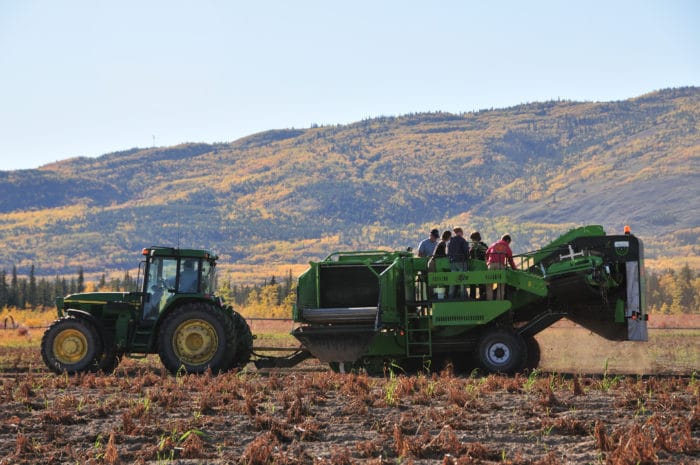
“(We harvest) normally by the end of August, beginning of September. (The plants) mature faster,” Jackie Milne, NFTI president, says. “What’s important to understand is plants grow based on hours of sunlight. We have the equivalent of an extra 30 days of sunlight added to our growth season.”
The short growing season isn’t the only food security issue. Transporting food or even supplies to grow food in the north is also a problem. If roads or railways are washed out or blocked, import costs rise. In some cases, it means delays in shipments.
You need to have “everything here — the machinery, the fertilizers, the chemicals, the processing, equipment, packaging — because if we run out of something, it could be anywhere from two days, a week or two weeks to get it,” Steve MacKenzie-Grieve with Yukon Grain Farm says.
Planning for every possible situation is the only way to make it through the growing season and produce a crop in the North.
Commercial Potato Production in the Yukon
When MacKenzie-Grieve and his wife Bonnie started their farm just outside of Whitehorse, Yukon, two decades ago they didn’t expect to become commercial farmers. MacKenzie-Grieve had built insulating storage systems in southern Alberta and the two planned to grow a bit of grain to sell to outfitters in the Yukon.
“When we came here, we started with some oats, and then it just kept growing. The market just kept feeling it. And in 2004, we put in a test to put in 25 acres of potatoes,” MacKenzie-Grieve says. “Then we started growing (potatoes) and the response we’ve had from our customers has been so positive.”
As they worked to establish the farm and discover what grew best in the northern region, they quickly found potatoes were one of the best crops to grow. Using MacKenzie-Grieve’s previous job experience building storage units for potato farmers in Alberta, he constructed a state-of-the-art storage shed and started growing spuds.
Yukon Grain Farm also grows 300 to 400 acres of grain for livestock feed. They grow 25 acres of spuds, six acres of carrots, two acres of beets, an acre of cabbage and half an acre of parsnips on irrigated land. All of the vegetables they grow are sold to Loblaws stores in Whitehorse, with some shipped to Dawson City. The potato crop usually lasts for nine to 10 months.
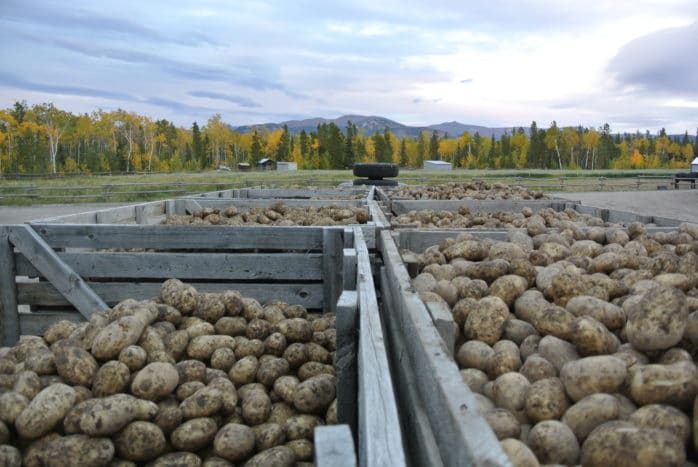
“Varieties for us are crucial, we will happily take less yield in order to get skin set,” MacKenzie-Grieve says. “Because these are table potatoes, they have to look good. They’ve got to be pretty, and they’ve got to taste good.”
MacKenzie-Grieve’s favourite potato variety is Sylvana, however it has been discontinued which means he’s testing out other varieties. The potato varieties Yukon Grain Farm grows need to be hardy and early maturing. They’ve struggled with red skin varieties because of the skin set, making yellow varieties a better fit.
There has also been struggles to find the right potato equipment. When they started growing spuds, they used equipment bought in Alberta and shipped north. However, they quickly discovered the equipment was made for larger spud production and wasn’t gentle enough for the thin skin sets of the early harvested northern potatoes.
“We bought an AVR harvester from Belgium and that harvester basically made this farm because it made potato farming fun. We harvest with that harvester, we put (potatoes) right into a box, right into the storage. So, there’s minimal handling,” he explains.
Another challenge the farm experienced was finding a fertilizer system which fit their operation as crop nutrition is critical for the short growing season. Through trial and error, they discovered less nitrogen is better than more. They’ve also encountered some disease issues, with cold soil diseases such as scabs and dry rot affecting their crops.
Extending the Northern Growing Season through Research
Researchers at AAFC are also looking into how to improve food production in northern Canada though. The four-year project has vegetable researchers testing season extension technologies in the cold, northern climates.
“Season length is a really large challenge in most other places, because the season starts a bit later and ends earlier when frost starts to come,” Rick Peters, an AAFC research scientist. “There’s opportunities too because some of the pests and diseases that we deal with regularly down south may or may not be in some of these other locations.”
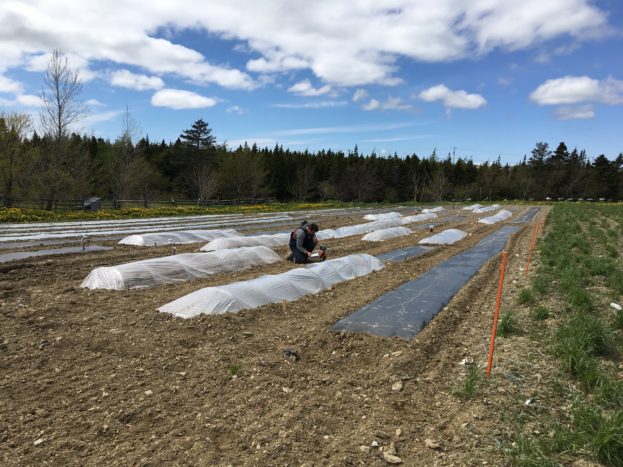
The project has AAFC scientists collaborating with local researchers and farmers in northern communities to test season extension technologies such as low tunnels and bio plastic mulches to grow potatoes, green beans, carrots and rutabagas. Bruising and storing of potatoes, along with what pests and diseases affect potatoes there are, are also being tested. The project was originally meant to take place over three years starting in 2019 but was extended a year after the pandemic halted planting of test plots in 2020.
The season extension technologies are meant to warm the space around the seeds or plants to help them germinate faster and mature before the end of the short growing season, Wheeler explains. They are also evaluating the impact of bioplastics and mulches on soils, which are meant to break down into the soil, but have not been tested before in northern climates.
Potatoes are being planted at sites in the Yukon, Happy Valley-Goose Bay, N.L. and St. John’s, N.L. Duplicate trials in Harrington, P.E.I. are being planted for baseline comparisons to the northern test plots.
“This represents a collaboration between multiple different groups. And just really offers a good opportunity to work together in some of these communities, where there’s a lot less research focused on how to develop the sustainable food systems it needs,” Wheeler explains.
True Potato Seeds a Match for Northern Canada
Season extension technologies isn’t the only AAFC project happening in the North. In the Northwest Territories true potato seeds are also being tested by AAFC scientists in collaboration with NFTI.
NFTI was found in 2014 by Milne. An avid gardener, Milne would find herself fielding questions about growing gardens from neighbours. As more people inquired, she realized there was a need for a formal teaching program, so in 2014 Milne founded NFTI. The institute offers programs to teach people to grow their own gardens and raise some small livestock. The majority of people attending classes are Indigenous.
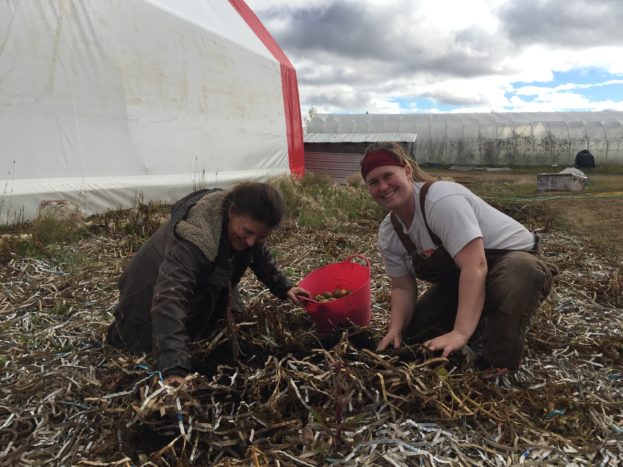
“It’s a grassroots designed educational platform that I based my own personal journey on of learning. Like what I wanted to know, what would it take for me to contribute to feeding my family of five in this northern city? It just came from that,” Milne explains.
One of the foods Milne has focused on growing is potatoes. The health benefits of the tuber make it a good fit for the North. Through garden beds with soil including layers of reindeer moss and cattails, amongst other things, Milne grows red and yellow skin varieties.
In 2020, as the pandemic hit and processing contract volumes were cut in southern Canada, a farmer from Lacombe, Alta. donated 25 tons of seed potatoes to the Northwest Territories through NFTI. The news made headlines, with AAFC researcher Helen Tai seeing the story.
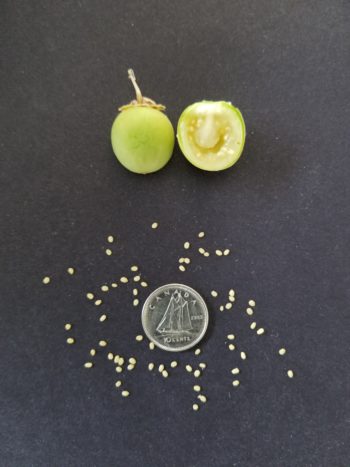
“It just impressed me about how much is being sent over and the difficulties that you have, when you’re shipping seed tubers. And that reminded me a lot of the work that we have been doing on true potato seed,” Tai explains. “It’s a very small quantity of seed that’s required. So, that’s why I thought maybe for northern production, using true potato seed might be an option.”
Tai reached out to Milne about true potato seeds. As Milne learned more about the seeds, she quickly agreed they could be a perfect fit. Shipping potato seed tubers to the Northwest Territories is expensive and there’s concern the seed could spoil before it’s able to be planted. Another concern with shipment is diseases could be brought into the area. True potato seeds on the other hand, can be shipped through the mail, stored for years and carry few diseases.
For the past year, Tai and Milne have worked together to test growing and establishing true potato seeds in Hay River. David de Koeyer, head of AAFC’s potato breeding program, picked true potato seed families with early maturity for Milne to grow. Milne has been working to cultivate the seeds and discover the best way to establish them for planting outdoors. While the project is in the early stages, it’s already showing promise.
“This is huge. Potatoes from seed in my opinion, have the potential to make the biggest leap in food since the Industrial Revolution, since the Green Revolution,” Milne explains excitedly.
Until Milne sorts out the kinks with growing true potato seed though, she will continue to teach others in her community how to grow potato tuber seed in garden beds.
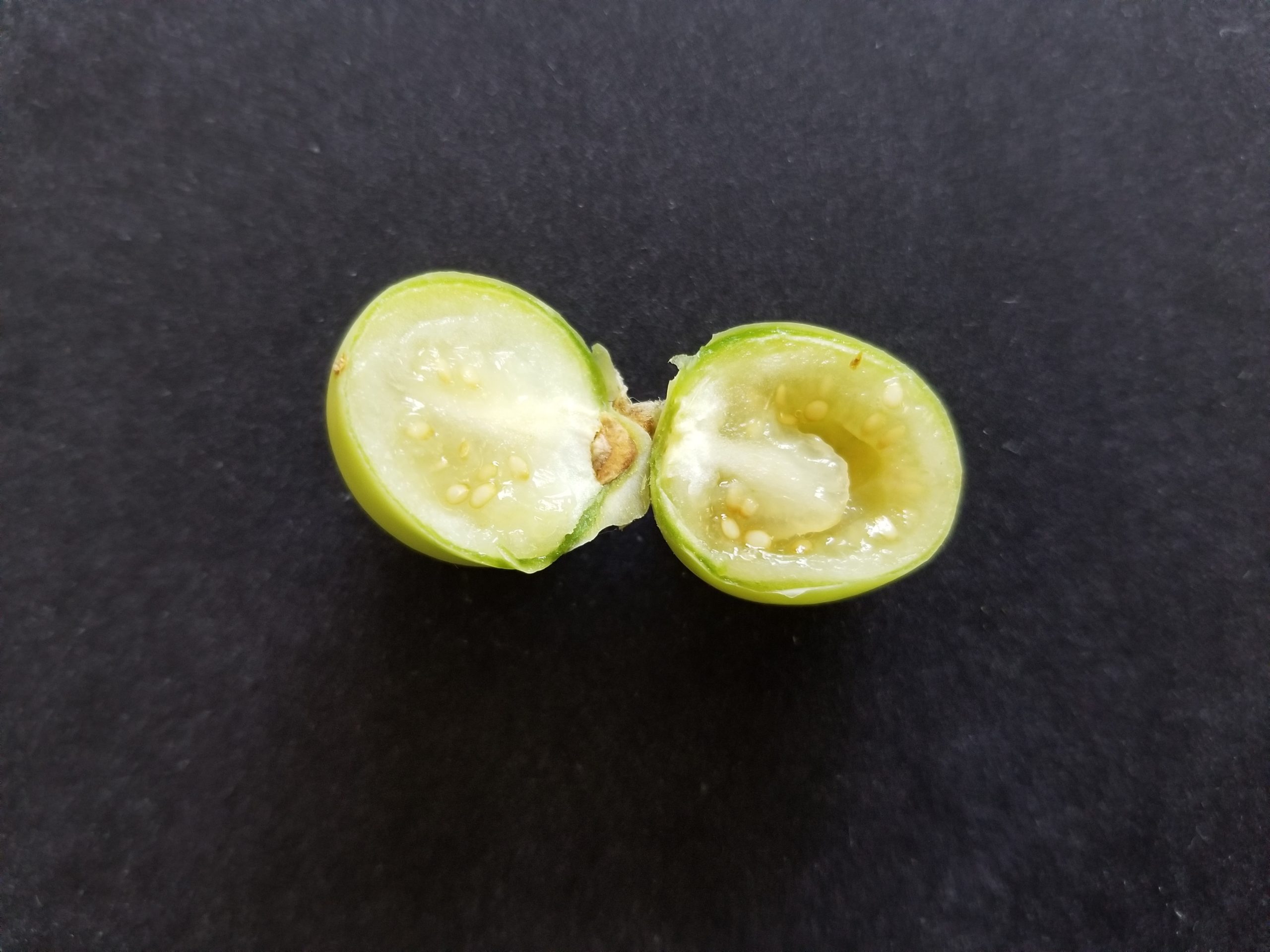
The 411 on True Potato Seeds
What are true potato seeds and what research is currently being done on this new seed
- True potato seeds are produced by cross-pollinating two plants which creates a seed ball containing the true potato seeds.
- Each true potato seed is genetically unique with genes from the two “parent” plants
- True potato seeds can speed up propagation of new potato. varieties which in the past has taken five to seven years to do. True potato seed can use a propagation phase where plants are grown from thousands of seeds.
- The remote mountainous country Nepal has had good experience growing potatoes using true potato seeds.
- AAFC is working with American potato breeders and the International Potato Centre to research diploid potato breeding and propagation through true potato seed.
- Canadians can get true potato seeds through Tuberosum Technologies Inc. in Broderick, Sask.
A More Secure Food Future in Canada’s North
There is other work being done to increase food security across Canada’s North though as governments and individuals work to provide easier access to food.
In February, the Northwest Territories government announced $400,000 in funding through the Canadian Agriculture Partnership to increase the production of fresh, healthy and locally grown food in the territory. Through this program, three commercial growers in Hay River have received money to increase production and update equipment.
The government in the Yukon revamped the territory’s agriculture policy in 2020. The policy calls on the territory to increase its food production self-sufficiency and produce high-quality local food. Some of the ways the territory plans to do this is through making new agricultural land available and supporting sustainable agriculture practices.
The Yukon has been supportive of agriculture even prior to the new policy, with MacKenzie-Grieve saying they have received support over the years at Yukon Grain Farm.
“I think a big thing is we have a lot of support from our stores, we have a lot of support from the territorial government, because what we do is actually real food security,” he explains.
While AAFC might have their current projects looking at season extension technologies and true potato seeds in the North, their scientists are planning for future research work. Wheeler is hoping to expand the variety of crops they grow in future projects.
With ongoing work, there is hope to solve some of the problems of growing food in the North and to help make for a more secure food future.
Editor’s note: All interviews were completed over the phone.
Related Articles
Three Potato Growers Awarded Leases in Newfoundland and Labrador

